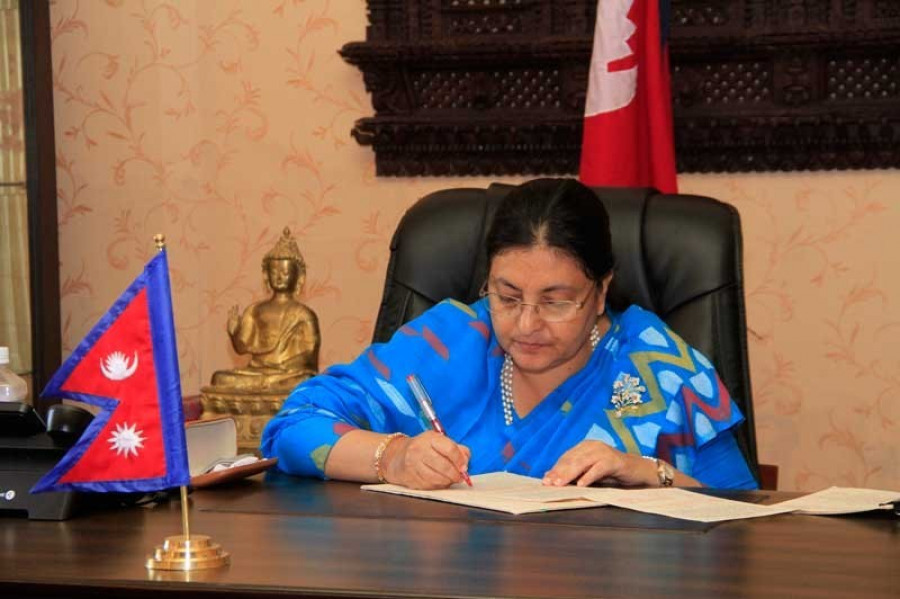National
President appoints 20 to constitutional bodies while case is sub judice in court
With the House dissolved, their hearings could not be conducted. Lawyers argue that provision of appointment after 45 days is applicable only when hearing is possible.
Binod Ghimire
Even while the recommendation for their appointments remains sub judice in the Supreme Court, President Bidya Devi Bhandari on Thursday appointed 20 chairs and members in 11 different constitutional commissions without the parliamentary hearing mandated by the constitution.
The Constitutional Council had controversially recommended their appointments in 11 different crucial constitutional bodies including the Public Service Commission, the Commission for the Investigation of Abuse of Authority and the Election Commission on May 9.
Prior to the appointments, the KP Sharma Oli government on May 4 had issued an ordinance to amend the Constitutional Council Act (Functions, Duties and Procedures) 2010 allowing a majority of the existing five-member council to hold its meeting.
“The amendment to the Constitutional Council Act is against the spirit of the constitution. I had sought the Supreme Court’s intervention to invalidate it and scrap the appointments,” advocate Om Prakash Aryal, who moved the Supreme Court on June 14 challenging the ordinance, told the Post.
In his petition, Aryal had argued that the recommendations made on the basis of the ordinance are against constitutionalism and the balance of constitutional power.
But the court is yet to hold hearings on the writ petitions challenging the ordinance, which contradicts the Constitution of Nepal.
“The Supreme Court wasn’t interested in hearing the writ petitions against the ordinance and the recommendations,” Aryal said.
The ordinance had earlier been issued in December. Any ordinance has to be presented in the House in the very first meeting of a new session and must be passed within 60 days. But the ordinance in question couldn’t be tabled in the first meeting of the reinstated House of Representatives on March 7.
The Oli government had reissued the ordinance on May 4.
Before the amendment, the Constitutional Council Act (Functions, Duties and Procedures) required that five of the six members of the council must be present at its meetings.
The council is composed of the Prime Minister, the Chief Justice, the Speaker, the chair of the National Assembly, the Deputy Speaker and the leader of the opposition in the House of Representatives. However, the lower house had been without a Deputy Speaker since January last year after Shiva Maya Tumbahangphe resigned.
Speaker Agni Sapkota and the leader of the opposition, Nepali Congress President Sher Bahadur Deuba, have not attended the council’s meetings since the amendment to the Act.
The council’s meeting chaired by Prime Minister KP Sharma Oli and attended by Chief Justice Cholendra Shumsher Rana and National Assembly chair Ganesh Prasad Timilsina made the recommendations.
“The recommendation was made with Rana’s consent,” said Aryal. “When the chief of the judiciary seeks his share in appointments, this is bound to happen. I see foul play on the part of the chief justice more than anybody else in these unconstitutional appointments.”
The Constitution of Nepal has a mandatory provision of parliamentary hearing for those recommended to constitutional commissions before their appointment.
Article 292 of the constitution provisions parliamentary hearings for the justices recommended by the Judicial Council and those recommended for appointment in constitutional bodies by the Constitutional Council.
A 15-member joint committee representing both Houses of the federal parliament is formed to conduct the hearings as per the Article 292 (2) of the constitution.
However, as President Bhandari dissolved the House of Representatives on May 21 on the recommendation of the Oli government, parliamentary hearings could not be held.
Earlier on December 20 too, days after the Constitutional Council had recommended 38 names for chairs and members in various constitutional bodies on December 15, Oli had dissolved the House of Representatives. Among those recommended then were chairs and members for the Commission for the Investigation of Abuse of Authority, members for the Election Commission and all five office bearers for the National Human Rights Commission.
Aryal had challenged the decision at the Supreme Court the very next day but there was no hearing on his writ petition even though it had been scheduled for hearing 17 times.
Consequently, on February 3, the President appointed 32 of them to the constitutional bodies.
As per Rule 26 (2) of the Joint Parliamentary Meeting Regulations, there would be no obstruction for the recommended individuals to assume their positions in constitutional bodies if the hearing committee fails to take any decision within 45 days of receiving the list of nominees from the Constitutional Council.
Experts, however, argue that this provision of the regulations comes into effect only after the hearing process begins.
“The provision in the regulations isn’t for those whose parliamentary hearing hasn’t begun,” Raju Prasad Chapagain, chair of the Constitutional Lawyers’ Forum, told the Post.
Another writ petition filed at the Supreme Court by senior advocate Dinesh Tripathi on February 4 demands barring the newly-appointed officials from working. There has been no hearing on this petition either, although the court issued a show cause notice to the Constitutional Council, its chair the prime minister, and its member.
“It is evident that the court is complicit in the council’s recommendation and the subsequent appointments,” said Aryal. “You can do nothing when the state agency that is supposed to protect the constitution and the rule of law becomes complicit in unconstitutional acts.”




 13.12°C Kathmandu
13.12°C Kathmandu














